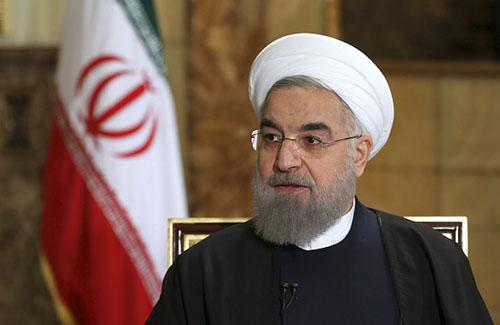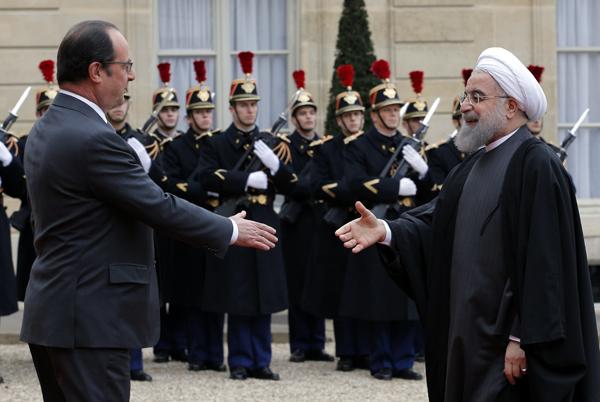You are here
Rouhani invites US firms to invest in changing Iranian economy
By Reuters - Feb 03,2016 - Last updated at Feb 03,2016

In this photo released by official website of the office of the Iranian Presidency on Tuesday, President Hassan Rouhani speaks in an interview with state-run TV at the presidency office in Tehran, Iran (AP photo)
DUBAI — Iran has no problem with US companies investing in its economy and creating joint ventures, President Hassan Rouhani said on Tuesday, and he called for foreign investment and diversification away from oil.
The president said the lifting of sanctions last month under a nuclear deal with world powers would see foreign investment turn Iran into an exporter of manufactured goods and ease the economy's reliance on oil exports.
But he also took a swipe at a hardline vetting body that has excluded many of his moderate allies from running in two important elections in the Islamic Republic later this month, raising the prospect of political instability that would be of concern to would-be investors.
Several major multinational firms have rushed to establish a position in Iran as it reopens for business after the lifting of sanctions that had isolated and hobbled its economy, in exchange for curbs on its disputed nuclear programme.
Nevertheless, many contracts have not yet been finalised, and some companies are concerned about a wide range of business risks in the Iranian market. US companies in particular have held back due to separate US sanctions that remain in place.
"If US companies are willing to come and invest in Iran, to bring manufacturing to Iran, we have no problem with that," Rouhani said in a wide-ranging interview aired live on state TV.
He said Iran's economy would change dramatically, away from importing goods paid for by oil sales and towards developing industry through joint ventures with foreign firms, with a view to exporting manufactured goods including cars.
World-class manufacturing
"In terms of cars, we must be world class... The recent contracts signed in France involve investment in Iran and manufacturing cars inside the country, and cars will be exported," he said.
Rouhani visited Rome and Paris last month, where he oversaw a joint venture deal between French carmaker PSA Peugeot Citroen and Iran Khodro. Carmaking is the second largest sector of the Iranian economy after oil.
Iran still plans to boost oil exports now that sanctions have been removed, but the plunge in prices over the past 18 months from above $115 a barrel to below $35 a barrel has squeezed the OPEC exporter's economy.
"Of course the fall in oil prices has put pressure on us, but besides that we can see an opportunity," Rouhani said. "Even if the oil price rises, we should still rely more on non-oil exports."
He also said Iran's tourism industry could be as strong as that of France and that his country needed 8 per cent economic growth in order to deal with inflation and unemployment, both of which stand above 10 per cent.
Nevertheless, Rouhani acknowledged that reforms would be needed in order for his desired economic transformation to succeed. Citing clerical Supreme Leader Ayatollah Ali Khamenei, who outranks him, he said most of Iran's problems were internal and not caused by sanctions.
Trouble ahead
"The leader said sanctions caused 40 per cent of the country's problems: 60 per cent of our problems are not related to sanctions, they are related to our own internal problems."
Powerful conservative factions in the Islamic Republic's complex, multi-tiered political system oppose Rouhani's plans to open the Iranian economy to the world, fearing an infiltration of Western values and influence — as well as the erosion of their own economic power.
The president hopes his "nuclear dividend" can give victory to his allies in the February 26 elections to parliament and the body that will appoint the next supreme leader. But the guardian Council, grouping hardline conservative clerics and jurists, has already disqualified thousands of candidates.
Rouhani said he would do everything in his power to ensure a free and fair vote. But Khamenei has indicated that he stands behind the widespread exclusion of candidates.
"There should be no doubts in anyone's mind about these elections, and we must all work actively towards that," Rouhani said. His ally, former president Akbar Hashemi Rafsanjani, also criticised the council this week.
Related Articles
PARIS — President Hassan Rouhani hailed a "new relationship" between Iran and France during a visit Thursday that saw the signing of a host
TEHRAN — Automobile industry officials from Iran, Russia and Turkey are considering joint car design and manufacture after sanctions on Mosc
TEHRAN — A year after its nuclear deal took effect, Iran is increasingly concerned over the arrival of US President-elect Donald Trump, who












